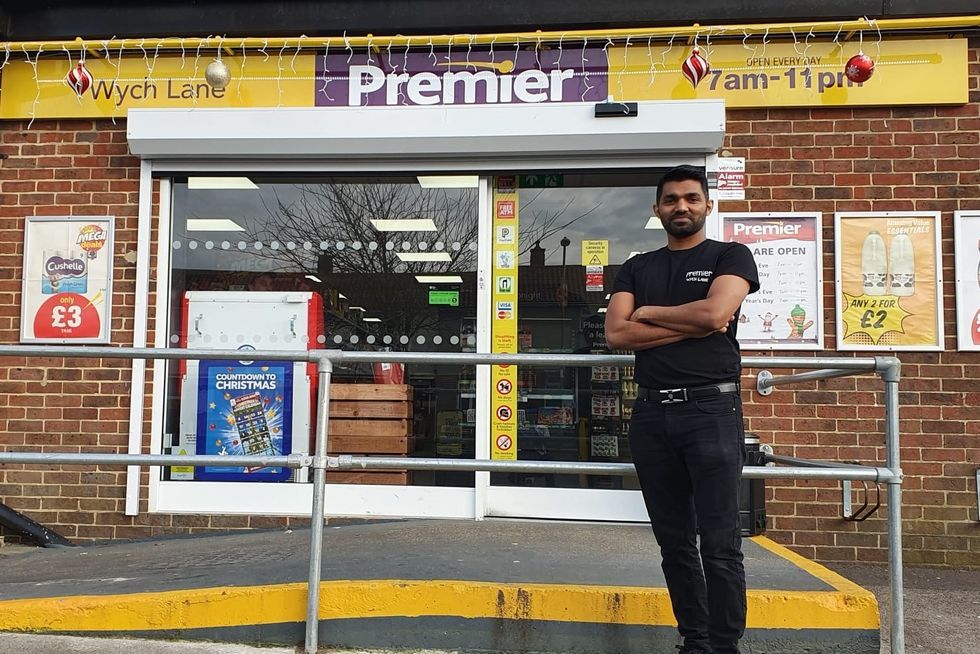As October approaches, convenience store owners across the country are getting more and more concerned over the viability of their businesses. While retail trade bodies continue to raise alarm on the matter, retailers are now resorting to help themselves by using tricks and tactics to cut down their energy bills as much as they can.
Over the last year, gas prices have soared to record levels as global demand intensified in Europe owing to low gas storage levels and a drop in pipeline imports from Russia, thereby further pushing electricity prices.
Earlier this month, energy regulator announced recently that it will raise its main cap on consumer energy bills to an average £3,549 from £1,971 a year and will recalculate the cap every three months rather than every six months to reflect current market volatility.
This spike in the bill is having a crippling effect on local stores. According to the Association of Convenience Stores (ACS), energy costs have skyrocketed to over £45,000 a year for an average small convenience store at around 1,000sq ft., more than doubling for many retailers. For larger stores around 3000 sq. ft., these costs can be in excess of £100,000 a year.
Overall, the spiraling cost of energy is expected to cost convenience stores at least £2.5 billion this year, ACS warned Chancellor last month.
Local shops have been UK’s lifeline. Earlier big supermarkets and e-commerce and later Covid threatened the viability of corner stores though they prevailed. But in the words of ACS chief executive James Lowman, the higher energy bills will makes some convenience stores “unviable” and they will be “forced to close”.
Over the Platinum Jubilee weekend Retailer Mukesh Patel was honoured with Her Majesty’s award in lieu of his services during the pandemic. In a span of two months, he is in a state of confusion over the future of his shop.
“I expect my bill to go considerably high from October. I dread to think what will happen to my shop,” Patel, who is running Capel News in Capel village in Surrey for 36 years, told Asian Trader.
Patel is not alone here as a recent survey shows that many business owners are equally perplexed, with some even contemplating shutting down. In a survey conducted at the end of August by Bira, 65 percent of business owners had said a price rise would force them to reduce the number of staff they had or reduce wages, while 40 percent were considering limiting opening hours, while 23 percent were looking to permanently or temporarily close their business once the proposed price hike came in October.
It is not only retailers but wholesalers are also facing this problem as their operating costs too have spiked exponentially.
Wholesaler Parfetts told Asian Trader how rising costs are touching all parts of the economy. The employee-owned company is doing all it can to mitigate the challenges for retailers, like offering easy and efficient delivery, flexibility of payments so that retailers can benefit from credit terms.
Wholesaler Bestway revealed how it is too dealing with a mountain of increased cost.
“At Bestway, our energy costs account for 10 percent of our total business operating costs. We are seeing energy bills now rising by 130 percent,” a Bestway spokesperson told Asian Trader.
However, some retailers as well as wholesalers have switched to new providers in an attempt to find ones that can offer a better deal. Retailer Imtiyaz Mamode of Premier store in Gosport is one such store owner who is not as hassled as his peer and is not dreading October that much, unlike his counterparts.

“I have a new contract with Octopus Energy lasting till 2024 under which my bill comes 2500 to 3000,” Mamode told Asian Trader.
“My bill amount was touching 4000 to 5500 pounds per month. It was getting too expensive so I started searching for a new provider. My present supplier has given me a fixed rate for two years and I am happy that I am able to save 1500 to 2000 pounds straight away.”
“If I decided not going with the fix and chosen fluctuating price instead, then at the moment, I might have been paying 4000 or 5000 easily more,” he says.
Bestway too stated that it has negotiated a new plan for the next 24 months in an effort to cut operating costs.
“We see this being a temporary increase but in order to try and stabilise the increased costs we have negotiated and agreed a new tariff from July 2022 for 24 months,” the spokesperson said.
Cut It Down
Patel of Capel News, as for now,is cutting down the energy spent in an attempt to keep the bill amount in control. He revealed how he is not using lights in some areas of shop “unless necessary” and now “switches off freezers at night”.
Echoing similar tactics, retailer Mamode advises his peers to invest in the store’s basics and get electrical that consume less energy.
“There are lot of chillers and freezers that claim to consumer 20 percent less energy. They are expensive but in the long run, they are always a better deal as they help in saving 15 to 20 percent of the energy bill,” he said, adding that “switching to LCD display” and “switching off freezer” at night are also ways to bring down the bill amount.
Convenience specialist Dev Dhillon agrees with Mamode here when it comes to equipment.
“Now is the time to purchase energy-efficient equipment, particularly refrigeration. The return on investment is now far more compelling than in the pre-energy crisis,” Dhillon told Asian Trader.
“Future-proof your stores and create a positive sustainability message for your customers.
Dhillon also advises retailers to pay for an energy audit of the business.
“It will benchmark your energy footprint versus similar-sized operations and identify equipment that may require maintenance or replacement.
“If you have a foodservice offer, implement it to high standards. Equipment like ovens now come with increased costs so you must ensure that you are getting maximum value from their use,” says the expert.
Earlier this month, British Retail Consortium (BRC) released a step-by-step guide for retailers to become energy efficient. Like Dhillon, BRC too advises retailers to review their equipment, clean filters of ventilators and heaters to ensure nothing is blocking air ventilation outlets and defrost freezers regularly.

The guide also mentions steps like turning heating down by one degree (- 1℃ saves approximately six percent), keeping doors and windows closed and using signage on doors instead to say the store is open.
Bestway also stated that it is now being more careful about energy usage across the whole business and working through various ways to introduce energy efficient measures including more efficient lighting and regulating the use of energy more closely.
Food and Convenience retail industry expert Scott Annan warns that if business energy bills continue at the five-to-10-fold increase, then thousands will “shutter down”.
“Independents can draw on their reserves, increase borrowing or sell some assets to raise cash to pay these increased bills. Prices will have to rise at the same time as most of us cut back on discretionary spending such as a £2.80 coffee. A perfect storm!
“National and big retailers will have fixed or hedged their energy pricing through say mid-2023 as ‘best industry practice’. Fixing or hedging pricing at today’s rates is not an option. I know of restaurants that will pay their forward year’s rent and not open, the owners preferring to take a paid job,” Annan told Asian Trader.
In Annan’s words, recommendations of new kettles or aluminum foil behind radiators are “moronic nonsense and shows how out of touch MPs are of the real world”!
Clarion Call
Tackling the energy crisis was one of the main agenda for the incoming prime minister. Soon after assuming office, newly-appointed prime minister Liz Truss announced the much-anticipated support plan under which typical household energy bill will be capped at £2,500 annually until 2024 and six-month scheme for businesses providing equivalent support (to be reviewed in three months’ time).
Welcoming the announcement, ACS reiterated that help may be needed for local shops beyond the current six-month time frame while National President of the Federation of Independent Retailers (the Fed) said that the “devil is in the detail”. Both ACS and Fed have called for a price cap for local shops in line with the domestic market and longer-term support.
The Federation of Small Businesses (FSB) too welcomed the help but said the announcement was "sparse on detail" while BRC stated that businesses need clarity on the government’s intentions as soon as possible.
Some industry leaders have also raised concerns over how exactly the plan will work and impact the retail grocery sector.
James Bielby, Chief Executive of Federation of Wholesale Developers (FWD), welcomed the necessary intervention but also claimed that it “won’t prevent energy cost increases in the food supply chain being passed on to retailers and caterers, and ultimately to consumers”.
“It’s encouraging that the government is committing to supporting ‘vulnerable industries’ including hospitality after the initial six months of the scheme, but we will be working hard to ensure that food production and distribution are also on that list,” Bielby told Asian Trader.
FWD has written to the new Chancellor of the Exchequer asking for an energy price cap for two years, freezing business rates for energy-intensive industries, government-backed zero-interest loans to be repaid over 10-15 years to supply energy costs, and reducing VAT for the hospitality sector.
Bestway, meanwhile, warned that as a national wholesaler with thousands of independent retailers as customers, it is seeing almost all customers under cost of business pressure.
“Some retailers will not be able to mitigate or manage such increases and are at risk of going out of business. We would urge the government to put into play immediate measures to keep the energy cap for small businesses, which is currently under review by the government,” the spokesperson said.
Although the industry has broadly welcomed Truss’ plan, retailers’ bodies and wholesalers are uniting to raise an appeal to the government to provide long term relief to local businesses before some are forced to close down the shutters.
In the words of Fed National President Jason Birks, if the situation continues, it may only be a matter of time before communities lose access to the groceries and services that local stores provide – but more importantly “they will also lose a heart”.





